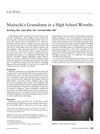 1 citations,
January 2022 in “Advances in animal and veterinary sciences”
1 citations,
January 2022 in “Advances in animal and veterinary sciences” Ketoconazole cream effectively treats fungal skin infections in cats.
[object Object]  August 2023 in “Authorea (Authorea)”
August 2023 in “Authorea (Authorea)” Tinea capitis should be considered in adults with scalp issues for proper treatment.
 November 2024 in “International Medical Case Reports Journal”
November 2024 in “International Medical Case Reports Journal” Glucocorticoid treatment in lupus can cause oral lesions, which need early diagnosis and comprehensive care.
 51 citations,
January 2014 in “Pediatric Clinics of North America”
51 citations,
January 2014 in “Pediatric Clinics of North America” The guide explains how to identify and treat children's hair loss, including fungal infections, autoimmune disorders, hairstyle changes, self-correcting conditions, and behavioral therapy for hair-pulling.
 9 citations,
January 2008 in “Medical mycology”
9 citations,
January 2008 in “Medical mycology” A dog's skin infection caused by the fungus Chaetomium globosum was effectively treated with ketoconazole.
 350 citations,
June 1989 in “The American Journal of Medicine”
350 citations,
June 1989 in “The American Journal of Medicine” Itraconazole is potentially effective for treating invasive aspergillosis, but more research is needed.
 5 citations,
December 2022 in “Annals Academy of Medicine Singapore”
5 citations,
December 2022 in “Annals Academy of Medicine Singapore” Some skin medications can have harmful interactions with the COVID-19 drug nirmatrelvir-ritonavir, but not with molnupiravir.
 1 citations,
January 2024 in “Journal of applied pharmaceutical science”
1 citations,
January 2024 in “Journal of applied pharmaceutical science” Bacteria from Xylocarpus fruit can be used in hair creams to treat hair loss and fight infections.
 2 citations,
October 2019 in “Current sports medicine reports”
2 citations,
October 2019 in “Current sports medicine reports” A high school wrestler's skin rash was cured with antifungal medication after a misdiagnosis and incorrect treatment led to a fungal infection.
 65 citations,
January 2005 in “American journal of clinical dermatology”
65 citations,
January 2005 in “American journal of clinical dermatology” Children with scalp fungal infections need proper diagnosis and treatment, usually with antifungal medications, and newer drugs may offer quicker recovery.
 2 citations,
January 2022 in “Eduvest”
2 citations,
January 2022 in “Eduvest” A teenage girl with a fungal scalp infection got better with antifungal and allergy medication, and special shampoo.
 January 2022 in “Eduvest”
January 2022 in “Eduvest” A teenage girl with a fungal scalp infection got better with antifungal and allergy medication, plus medicated shampoo.
 28 citations,
January 2000 in “Medical Mycology”
28 citations,
January 2000 in “Medical Mycology” Fungal infections in lab animals can interfere with research.
12 citations,
August 2016 in “Mycopathologia” A man's pubic hair infection was treated by shaving and using antifungal medications.
 18 citations,
May 1988 in “Journal of The American Academy of Dermatology”
18 citations,
May 1988 in “Journal of The American Academy of Dermatology” Itraconazole helps improve tough skin infections but may not prevent them from coming back.
 June 2024 in “Infection and Drug Resistance”
June 2024 in “Infection and Drug Resistance” An adult woman with scalp infection recovered after antifungal treatment, with no return of symptoms.

Seborrheic dermatitis and dandruff are often treated with antifungal and anti-inflammatory medications, which can reduce symptoms and yeast growth on the scalp.
 25 citations,
July 2021 in “Journal of Medical Virology”
25 citations,
July 2021 in “Journal of Medical Virology” COVID-19 can cause various skin issues, including rashes and hair loss, which usually heal on their own and don't always indicate severe illness.
 6 citations,
November 2014 in “The journal of investigative dermatology/Journal of investigative dermatology”
6 citations,
November 2014 in “The journal of investigative dermatology/Journal of investigative dermatology” Stephen Rothman made important discoveries in dermatology, including the use of PABA in sunscreens, but never profited from his work.
 19 citations,
October 2011 in “Clinics in Dermatology”
19 citations,
October 2011 in “Clinics in Dermatology” New chemotherapy drugs cause skin side effects, but treatments like minocycline and tetracycline can help reduce them.
6 citations,
October 1998 in “PubMed” Antifungal treatment can improve severe skin infections with cutaneous horns.
 April 2007 in “Dermatologic Clinics”
April 2007 in “Dermatologic Clinics” Understanding drug effects and careful monitoring are crucial for safe and effective dermatology treatments.
[object Object] 
Use the least toxic, most specific treatments for skin diseases, considering side effects and individual patient needs.
 6 citations,
August 1991 in “Pediatric Clinics of North America”
6 citations,
August 1991 in “Pediatric Clinics of North America” The document concludes that various hair and scalp disorders in children have specific treatments and proper diagnosis is essential.

Some medications, including retinoids, antifungals, and psychotropic drugs, can cause reversible hair loss if stopped or doses are reduced.
 January 2022 in “International Journal of Research Publications”
January 2022 in “International Journal of Research Publications” Griseofulvin effectively treats tinea capitis caused by Microsporum canis.
20 citations,
December 2021 in “Plants” Tamarix aphylla may be effective for various medical conditions, but more research is needed to confirm its safety and effectiveness.
1 citations,
January 2024 in “Journal of clinical medicine” Early recognition and treatment of tinea capitis are crucial to prevent severe scalp issues and prolonged therapy.
 1 citations,
November 2001 in “British Journal of Dermatology”
1 citations,
November 2001 in “British Journal of Dermatology” Oral cyclosporin doesn't stop hair loss.
 179 citations,
October 2018 in “American Journal of Clinical Dermatology”
179 citations,
October 2018 in “American Journal of Clinical Dermatology” Cancer treatments targeting specific cells and the immune system can cause skin, mouth, hair, and nail problems, affecting patients' quality of life and treatment adherence.


























